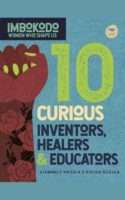Our second edited extract from the Imbokodo – Women Who Shape Us series, written by Athambile Masola and Xolisa Guzula, tells us about Prof. Tebello Nyokong. The start of the chapter, which comes from the book in the series entitled “10 Curious Inventors, Healers and Educators”, shares this inspiring quote from her:
My days as a shepherd prepared me to be a scientist without knowing it at that particular time … You have to figure out what is edible and what is not edible in the fields. You have to learn the birds. You have to learn the sounds. That is science, you know.
Prof. Tebello Nyokong was born in Lesotho in 1951. Her father was South African and her mother was from Lesotho. Growing up, her father used to say to her “I don’t care what you do, you have to be more educated than I am”.
She was also raised by her maternal grandparents in Lesotho. They lived in a rural village where she went to school and worked as a shepherd.
Prof. Nyokong studied at Lesotho High School and graduated with a BSc from the National University of Lesotho. She was awarded a scholarship to do her PhD in chemistry at the University of Western Ontario, Canada. She believes anyone can study science and does not believe that you should choose subjects according to gender: boys choosing science and girls choosing home economics.
After her time overseas, Prof Nyokong returned to teach at the University of Lesotho. In 1992 she began teaching at Rhodes University where she had to deal with students who had never been taught chemistry by a black woman. She is now a distinguished professor of chemistry at the same university where she leads the Centre of Nanotechnology Innovation.
Prof. Nyokong is known for her groundbreaking research in cancer. The new technology she developed is referred to as Photodynamic Therapy. Her research in South Africa has been innovative because it uses new technology such as lasers (a form of light) and molecules created in a lab to only treat cancer cells in a specific part of the body. This treatment is different to chemotherapy, the most common form of cancer treatment, which affects the whole body, included parts that are not infected.
She has developed medicine which can be used to treat early-stage cancer. She wants to make sure that Africans can access the medicine she produces by making the medicine affordable.
If you enjoyed this, you may like Imbokodo: Women who shape us here
Tell us: Do you like science and are you considering following it as a career?


